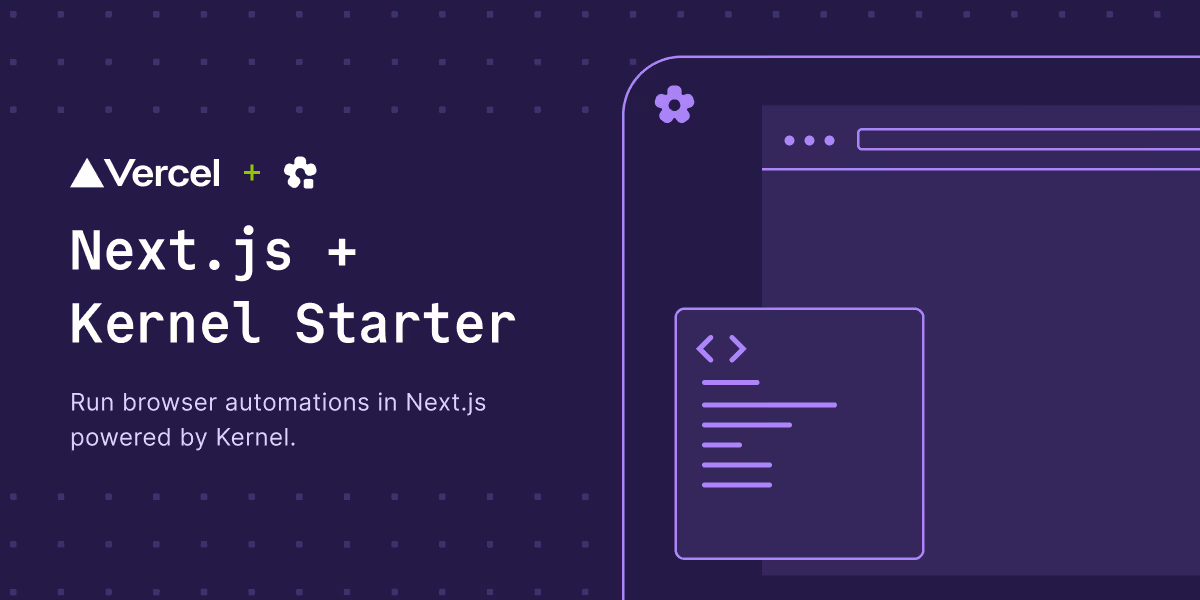
Remember the App Store launch in 2008? Five hundred apps. Flashlights. Calculators. A beer-drinking simulator that somehow went viral.
Nobody predicted what came next. Uber. Instagram. WhatsApp. Apps that redefined entire industries.
We’re at a similar inflection point. But this time, it’s not about mobile apps. It’s about browser automation tools—AI-powered systems that navigate the web, complete tasks, and operate autonomously on behalf of users.
Kernel, a startup building high-performance browser automation infrastructure, just raised $22 million in combined seed and Series A funding. Lead investor: Accel, with Y Combinator, and several top-tier VCs joining. The angel list reads like a who’s who of developer platform pioneers: Paul Graham, Solomon Hykes (Docker founder), David Cramer (Sentry founder).
These aren’t casual investors. They’re betting that browser automation tools will become foundational infrastructure for the AI economy—the AWS of the agent era.
What Browser Automation Tools Actually Do
Browser automation tools enable AI agents to interact with websites like humans do. Not simple scripts executing rigid commands. Intelligent systems that browse multiple pages, make decisions based on content, fill forms with contextual understanding, scrape and analyze data at scale, and manage authentication across platforms.
The difference from earlier automation? Adaptability. Where traditional tools followed pre-programmed rules, modern browser automation tools can interpret changing layouts, understand visual elements, make real-time decisions, and handle unexpected situations.
Companies like Kernel provide the infrastructure developers need. Rather than building custom browser automation from scratch—dealing with crashes, authentication nightmares, performance issues—developers use enterprise-grade APIs that handle the complexity. It’s democratizing access to capabilities that used to require large engineering teams.
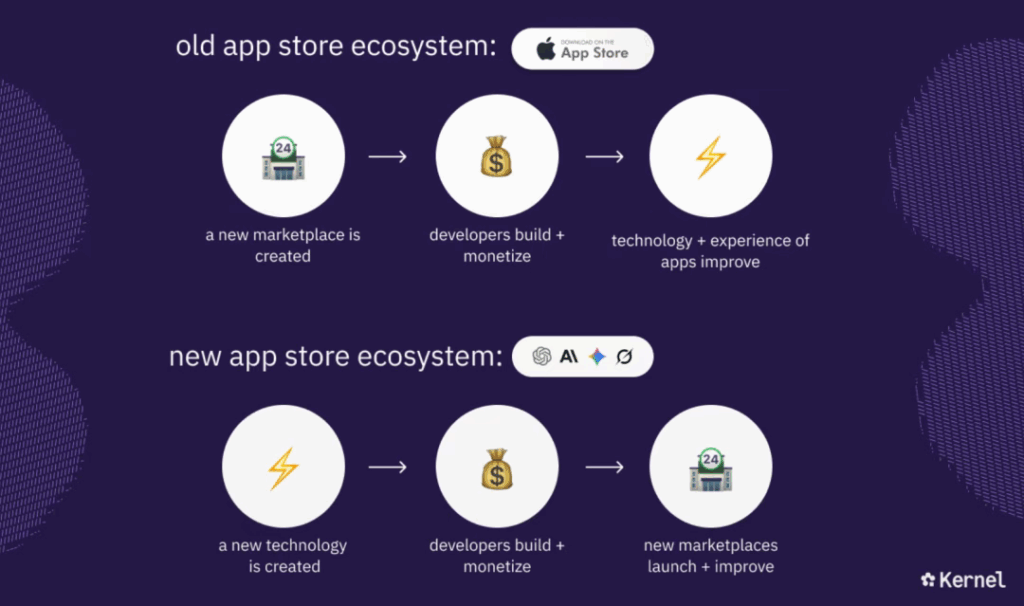
Think of browser automation tools as the new foundational layer. Just as AWS provided infrastructure for mobile apps, these tools provide infrastructure for AI agents. They’re not just useful. They’re essential.
Why the App Model Is Breaking
Every app is a silo. You open one app to book flights. Another for weather. A third for your calendar. This fragmented experience creates “walled gardens” where apps can’t communicate.
Planning a business trip? Check your calendar. Search for flights. Verify travel policy. Book a hotel. Update your calendar. Notify your team. Five different apps. Multiple copy-paste operations. High chance something falls through the cracks.
Browser automation tools eliminate these silos. An AI agent can access your calendar, search travel sites, cross-reference company policies, book everything, and update all systems—without requiring separate apps for each service.
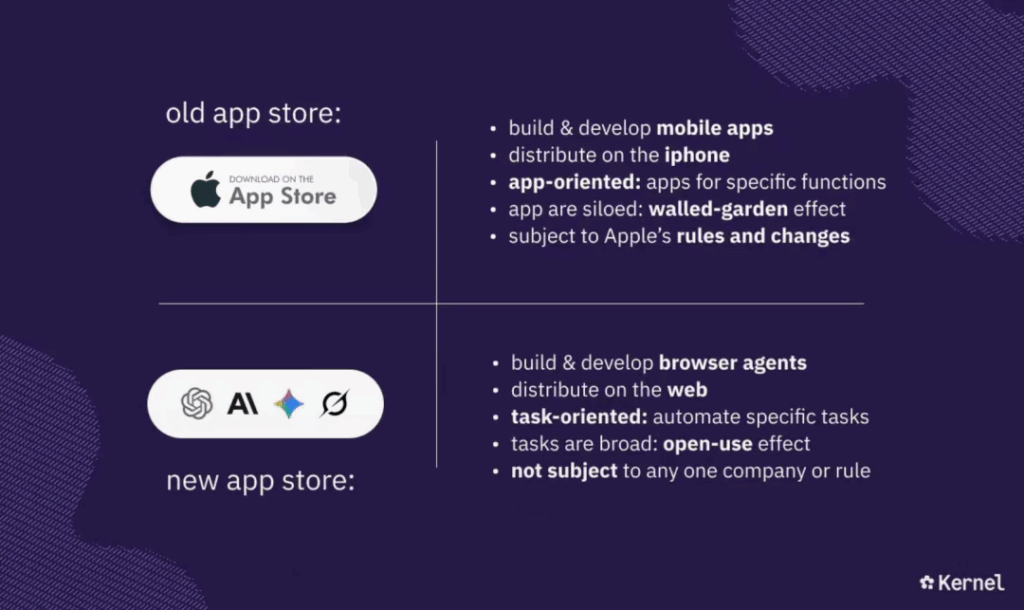
The shift is from app-centric to task-centric. Instead of “Which app do I need?”, you say: “Help me plan a trip to Paris next month.” The agent figures out which websites to visit, which actions to perform. It finds flights across multiple sites, checks hotel availability, verifies weather forecasts, identifies restaurants, marks travel dates, even checks if your passport needs renewal.
One command. Dozens of websites. Seamless execution. That’s the promise of browser automation tools.
Four Key Advantages
Task-Oriented Efficiency
Browser automation tools excel at multi-step workflows spanning multiple platforms. A business analyst compiling competitive pricing used to spend hours manually visiting competitor websites. With browser automation tools, an AI agent visits all sites simultaneously, extracts pricing, identifies matching products, generates comprehensive analysis—in minutes.
This efficiency extends to any repetitive workflow. The tools handle mechanical execution while humans focus on strategy, interpretation, and judgment.
Contextual Awareness
Modern browser automation tools leverage user-specific context. When you ask an agent to “find a restaurant for dinner,” it doesn’t return generic results. It considers your dietary preferences, checks your calendar to understand the context (business vs. casual), references your location and commute patterns, compares options against your typical price range, and notes if your contacts have reviewed nearby restaurants.
This transforms browser automation tools from simple executors into intelligent assistants that understand needs holistically.
Lower Developer Barriers
Developers build once for the open web. Their agents can interact with any website—not just those with public APIs. A solo developer can now create an agent orchestrating complex workflows across dozens of services. Something that would have required a large engineering team five years ago.

Breaking Data Silos
The internet consists of thousands of disconnected platforms refusing to share data with competitors. Browser automation tools solve this by enabling agents to navigate across boundaries. Pull sales data from Shopify, financial info from QuickBooks, marketing metrics from Google Analytics, customer feedback from review sites, inventory from supplier portals—then synthesize everything into actionable intelligence.
By connecting previously isolated services, browser automation tools multiply the value of existing platforms without requiring those platforms to change anything.
Inside Kernel’s Infrastructure
Kernel CEO Catherine Jue experienced the pain points firsthand at Cash App. Developers wanted AI agents to test merchant websites at scale but hit infrastructure limitations. Browsers crashed. Authentication broke. Performance degraded. Debugging tools failed.
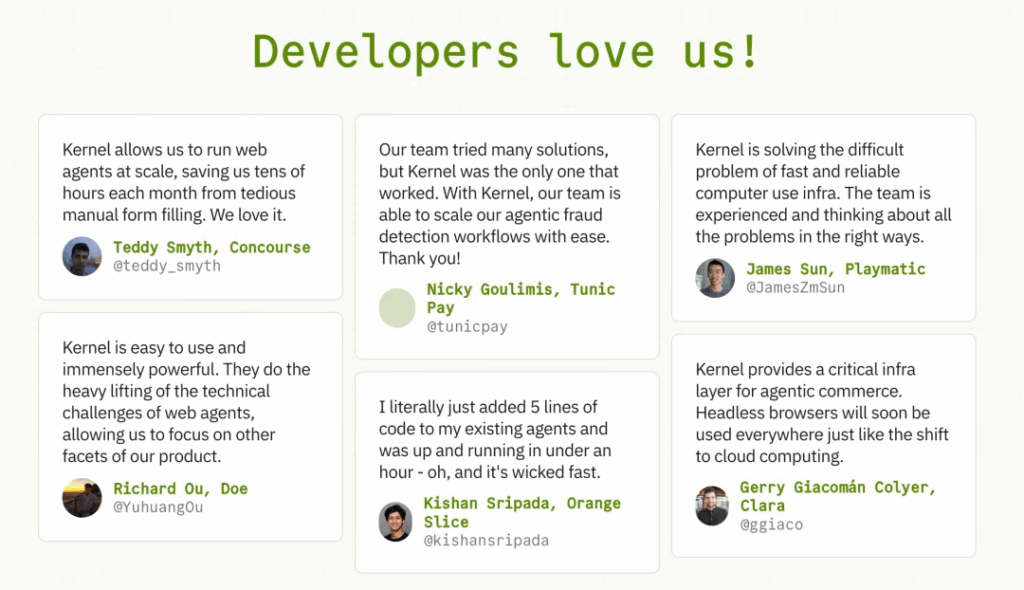
She co-founded Kernel with Rafael Garcia, who built Clever’s educational identity platform. Together, they’re solving the hard problems preventing browser automation tools from scaling.
Three critical capabilities:
Speed.Browsers launch in milliseconds. Kernel’s architecture uses pre-warming and resource pooling for human-like response times.
Observability. Users watch agents through live views, review session recordings, and intervene if needed. This transparency transforms browser automation tools from black boxes into controllable systems.
Authentication. Kernel’s platform lets users grant controlled, specific permissions. Authorize agents with granular controls, audit actions, revoke access instantly.
Clients include Cash App, Rye, and numerous YC startups.
Real-World Applications
Automated Research
One Kernel user runs ten parallel agents collecting job postings from specific companies. Over two months: 1,000+ automated tasks. Several hours saved weekly. This scale of data collection is impossible for human workers while maintaining accuracy and timeliness.
Lead Discovery
OrangeSlice deployed 10,000 agents to autonomously search for potential customers. This automated approach lets sales teams focus on meaningful interactions rather than tedious prospect research. Browser automation tools handle finding and qualifying leads; humans apply judgment and relationship skills to close deals.
Workflow Automation
One user employs agents to handle government form submission—administrative work that typically consumes significant labor. Automating this with browser automation tools freed up staff for higher-value work while ensuring accurate, on-time submissions.
Quality Assurance
Momentic AI functions as an AI employee dedicated to QA testing. For companies needing consistent user experience, continuous monitoring with browser automation tools is invaluable. These tools execute thousands of test scenarios that would take human QA testers weeks.
AI-Driven Experiences
Combining large language models with browser automation tools creates agents that read, reason about, and act on web content intelligently. “Find me a reliable contractor in my area with good reviews and availability next month.” The agent searches directories, verifies licenses through official databases, checks availability, reads reviews, and compiles recommendations with evidence.
Browser automation tools are just one part of a larger shift. AI agents are already transforming business ecosystems across multiple industries, from supply chain optimization to real-time risk management.
Why Now Is the Moment
The technology is fully mature. Large language models generate code in real-time and understand natural language with high accuracy. Visual AI interprets website layouts without site-specific training. Computer-use agents control full interfaces. All these capabilities combine to make browser automation tools remarkably capable—browsing, clicking, filling forms, scraping data exactly like humans. But faster, more consistently, at unlimited scale.
The infrastructure has matured too. Cloud platforms provide compute resources for thousands of simultaneous browser instances. Network connectivity enables responsive interactions. Security frameworks handle agent complexity. The technology stack is production-ready in ways it wasn’t three years ago.
The timing reflects genuine market momentum. The AI agent market is projected to reach $103.6 billion by 2032, growing at 45.3% annually, with 85% of organizations already integrating agents into at least one workflow.
And the ecosystem is deliberately decentralized. There’s no App Store for agents—no single repository or curated marketplace. This openness fosters rapid innovation and competition. Over time, directories will emerge, review platforms will develop, marketplaces will form. But this structure will grow from the bottom up, shaped by actual usage rather than imposed from above.
The early internet thrived because it was open and decentralized. Browser automation tools are following the same path.
Kernel’s Strategic Vision
Authentication Infrastructure. Granular permission controls, temporary access, audit trails, instant revocation. This transforms browser automation tools from risky black boxes into transparent systems enterprises can trust.
Computer-Use Agents. Kernel is expanding beyond browsers to agents controlling entire computer interfaces—desktop applications, files, command-line tools. This enables workflows that seamlessly move between web and desktop.
Standardization via MCP. The Model Context Protocol provides a common framework—think USB for AI agents. Kernel’s expanding support makes integration easier across the ecosystem.

Website Partnerships. Kernel works with websites to establish clear rules for agent access. This collaborative approach ensures browser automation tools benefit everyone.
The Broader Impact
“Agent-as-a-service” providers will offer specialized capabilities other agents access programmatically. Legal document processing. Financial analysis. Travel planning. These services will charge per-use and continuously improve through machine learning.
Personal AI assistants will become truly personalized. Your agent knows your dietary restrictions, understands your schedule, monitors finances, handles routine tasks. It operates continuously, using browser automation tools to monitor websites, take actions, surface information when needed.
The key: these agents work for you specifically. They protect your interests, maintain privacy, operate according to your values.
Investment Validation
Accel led the round. Their portfolio: Facebook, Slack, Dropbox. Y Combinator participated. Paul Graham spots fundamental shifts in software. Solomon Hykes founded Docker. David Cramer founded Sentry.
These individuals recognize when new infrastructure layers are forming to support the next generation of applications.
Investors view browser automation tools like mobile apps in 2008—a foundational shift creating a trillion-dollar category. Infrastructure providers like AWS and Stripe captured enormous value serving app developers. Browser automation tools represent similar opportunity.
Why Builders Should Act Now
Massive value accrues to those who recognize platform shifts early. When the App Store launched, developers who moved quickly—building first navigation apps, first social tools, first mobile games—captured outsized returns. Not because they were smarter, but because they acted while the ecosystem was forming.
Browser automation tools are in that phase now. Technology works. Infrastructure exists. Early use cases prove valuable. But the ecosystem is wide open. No dominant application. No established best practices.
This uncertainty creates extraordinary opportunity for bold builders.
Simple early iPhone apps seem quaint now, but they proved the platform and inspired the next wave. Current browser automation tools handling straightforward tasks are paving the way for transformative experiences.
Developers who invest in learning browser automation tools now, entrepreneurs who identify agent-first opportunities—they’ll gain advantages that compound as the ecosystem matures.
Kernel’s open approach makes it easy to start. The infrastructure is ready. The market is forming. The only remaining ingredient is vision.
Just as mobile apps changed how we navigate, communicate, and entertain ourselves, browser automation tools will change how we accomplish tasks and manage complexity. The innovators who shape this won’t necessarily be the biggest companies or best-funded startups.
They’ll be the builders who recognized the opportunity early and created experiences that showed the world what’s possible.
That opportunity exists today.
Tags:
Subscribe To Get Update Latest Blog Post




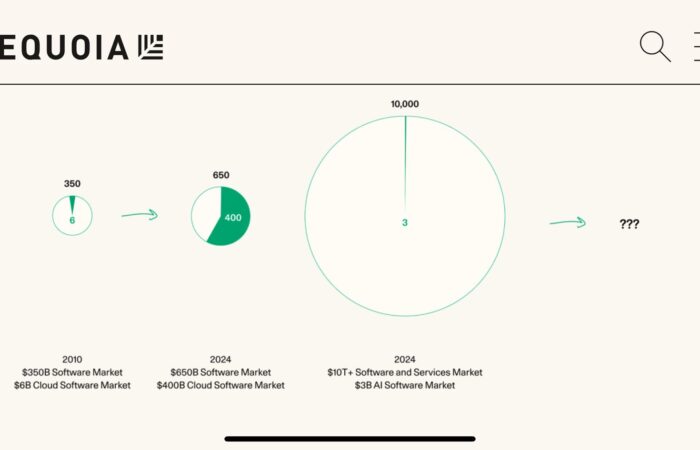
Leave Your Comment: